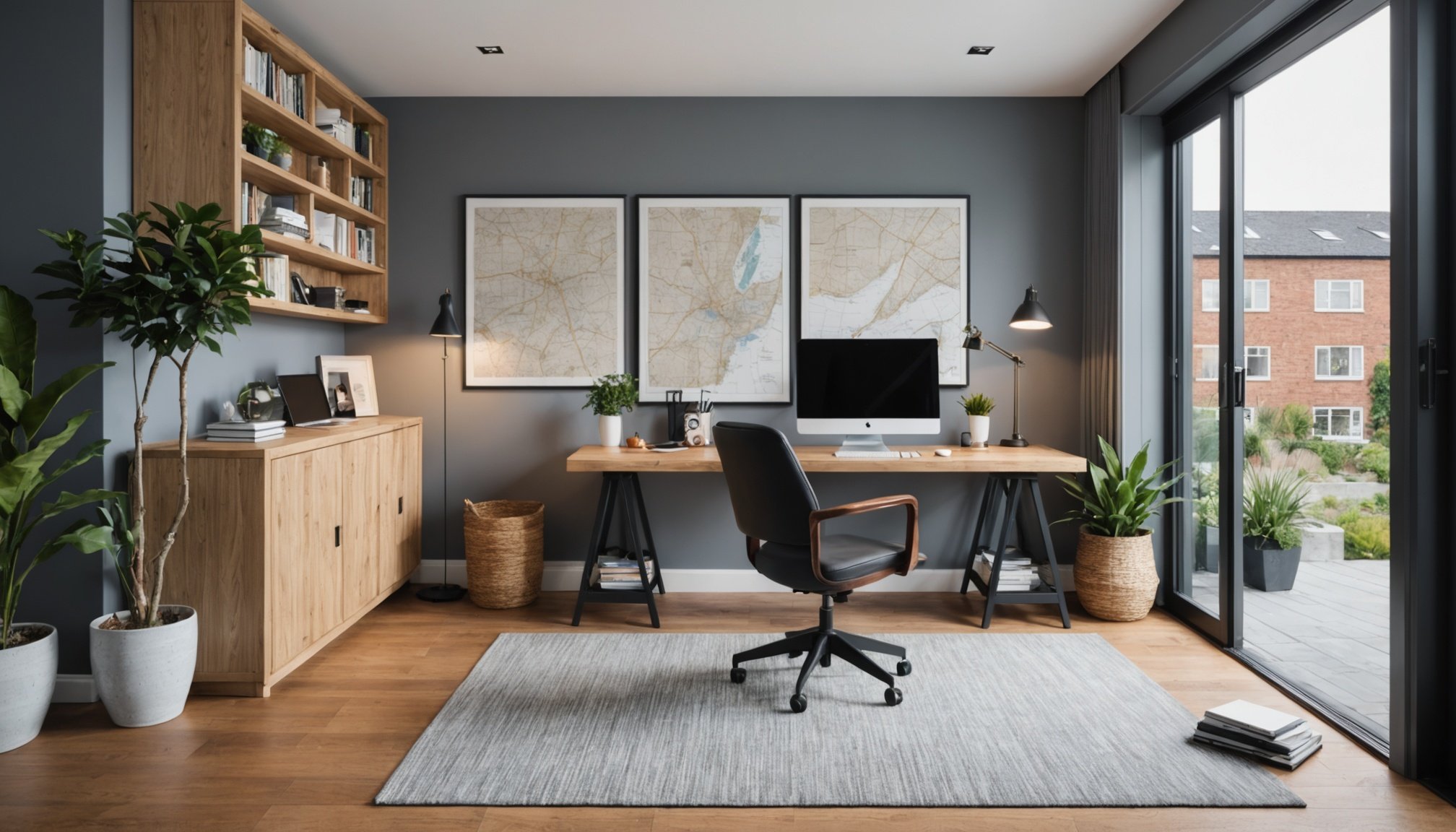Understanding Newcastle’s Zoning Regulations
Creating a home office setup in Newcastle involves navigating a nuanced set of zoning regulations. Understanding these Newcastle zoning regulations is essential to ensure compliance when planning your workspace. The city’s zoning classifications dictate where residential and commercial activities can occur, and not all residential areas permit the establishment of home offices.
Zoning classifications are split into categories which define permissible activities within specific areas. For instance, Residential Zones typically have stringent restrictions compared to Mixed-Use Zones, which may allow broader usage including small-scale professional practices. It’s crucial to determine if your residential area accommodates the commercial activities typical of a home office.
A lire en complément : Exploring the Impact of Developing Properties Close to Norfolk”s Protected Wildlife Zones
Key legal requirements involve adherence to regulations concerning noise levels, clients visiting the home, and external signage. You might need to apply for a permit if business affairs extend beyond normal residential activities. Also, ensuring sufficient parking space can be a prerequisite depending on visitor frequency.
For any homeowner, prior communication with local authorities will provide clarity on specific rules applicable to your property. This approach prevents inadvertent violations of local laws and enables a smooth transition to a compliant and effective home office environment.
En parallèle : Essential Factors to Assess for Conservation Easement Properties in Shropshire
Necessary Permits for Home Office Establishment
Establishing a home office in Newcastle requires understanding of the Newcastle council regulations on permits. Depending on the type of work and the expected number of visitors, different home office permits may be necessary.
The most common permits involve change of use applications or approvals for minor modifications within a dwelling. For instance, if engaging in activities that alter the main use of the building, a change in occupancy type might be necessary.
Step-By-Step Guide to the Application Process
-
Identify Needed Permits: Begin by reviewing Newcastle council regulations to determine which home office permits are applicable.
-
Prepare Necessary Documentation: Gather essential documents such as property deeds, work plans, and possibly, neighbour consent forms.
-
Submit Application: Complete the required forms and submit them to the council via their online portal or in person. Ensure all provided information is accurate to avoid delays.
-
Await Approval: After submission, the evaluation process involves reviewing the potential impact on the neighbourhood.
-
Receive Feedback: You may receive queries or requests for additional information. Address these promptly to facilitate a smooth conclusion to your application process.
These steps ensure a streamlined experience in setting up your home office legally and efficiently.
Compliance and Regulatory Considerations
When setting up a home office, zoning compliance is crucial. Zoning laws dictate what types of activities can occur in residential areas. For example, these laws may prevent some businesses from operating in a home environment. Understanding your local zoning compliance regulations can help you avoid legal issues.
Importance of Zoning Laws
Adhering to local laws ensures that your home office meets all necessary zoning compliance standards. Failure to comply can result in fines or demands to cease business activities. Often, zoning laws require a property to maintain a certain appearance or limit noise levels, preserving neighbourhood harmony.
Common Compliance Issues
Home office regulations often pose challenges. For example, zoning compliance might limit the number of staff members you can employ at a residential address. Parking spaces and traffic flow are other considerations that can complicate compliance. Implementing solutions like remote meetings can mitigate these issues.
Understanding these regulatory frameworks is essential for maintaining a legal and functional home office. Proactively seeking guidance on local laws can lead to a smoother home office setup. Additionally, consulting local government resources or legal advisors ensures full zoning compliance, ultimately protecting your business endeavours.
Potential Restrictions on Home Office Use
Operating a home office can be an attractive option, but it often comes with certain restrictions. Local zoning laws frequently dictate business limitations, regulating what activities can take place within a residential area. Common restrictions often revolve around noise regulations, hours of operation, and the type of business conducted. For instance, businesses that generate excessive noise may face challenges due to potential disturbances to neighbours, leading to the imposition of noise curfews or soundproofing requirements.
To thrive within these constraints, consider adopting strategies that optimise home office functionality. Start by understanding the specific restrictions applicable to your area, which often involves consulting local zoning manuals or municipal guidelines. Once identified, adhere to these regulations by, for instance, limiting loud tasks to designated hours, or using noise-dampening materials to comply with noise regulations.
Another practical approach is to modify workflows or schedules to minimise disruption. Explore alternative solutions such as virtual meetings to reduce visitor footfall and noise. Clever organizational tactics and technology can transform potential restrictions into opportunities, maintaining home office efficiency without infringing on local regulations.
Tips for Optimizing Your Home Office within Zoning Frameworks
Setting up a productive home office can be challenging, especially when zoning frameworks come into play. To ensure your efficient workspace meets all regulations, consider these key design considerations.
First, selecting the right location within your home is vital. Choose a quiet area, preferably well-lit, to boost your productivity and concentration. It is essential to be cognisant of zoning laws, which may dictate that your office space does not exceed a certain size or use particular utilities peculiar to residential areas.
When designing your home office, focus on home office optimization through ergonomic furniture and sufficient storage solutions, facilitating both comfort and functionality. These elements not only enhance efficiency but also contribute to maintaining compliance with zoning regulations by keeping your office organized and uncluttered.
Creative design solutions can make your workspace more compliant. For instance, utilising vertical space with shelves can help maximize room while adhering to zoning limits. Moreover, consider integrating noise-cancelling solutions or dividers if close proximity to busy areas cannot be avoided.
By following these best practices, you can establish a balanced, efficient workspace that adheres to zoning restrictions, ultimately creating a conducive environment for productivity.
Resources for Further Information
When navigating Newcastle’s complex zoning landscape, accessing reliable official guidelines is crucial. The Newcastle city council provides extensive zoning information resources online. To stay informed, visit the council’s official website, which hosts a wealth of documents and tools tailored to support planning decisions.
Zoning Information Resources and Tools
A key resource includes interactive maps providing detailed zoning classifications across the city. These maps are indispensable for property developers seeking to understand permissible land uses in specific areas. Additionally, the site offers downloadable zoning plans and legislation documents, which can be fundamental for professionals needing in-depth insights into current regulations.
For personalized assistance, the Newcastle city council offers contact details for planning officers who can help interpret rules and answer questions directly. Frequent updates ensure that the information is always current, mitigating the risk of relying on outdated data.
Utilising these official guidelines and tools will streamline the process of comprehending Newcastle’s zoning requirements. Engaging with the council’s online resources, including the comprehensive library of zoning documentation, enhances decision-making and ensures compliance with local ordinances.











